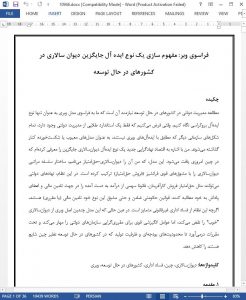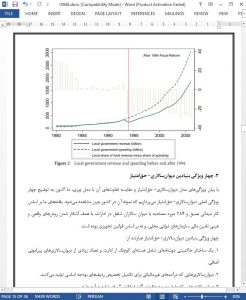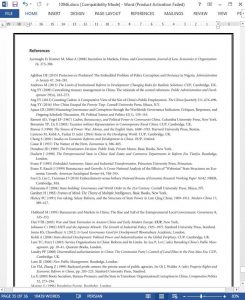Abstract
The study of public administration in developing countries requires that we look beyond the Weberian model as the only ideal type of bureaucracy. When we assume that there exists only one gold standard of public administration, all other organizational forms that do not conform to the Weberian ideal are dismissed as corrupt or failed. Drawing on neo-institutional economics, I introduce an alternative ideal type of bureaucracy found in contemporary China. This model, which I call bureau-franchising, combines the hierarchical structure of bureaucracy with the high-powered incentives of franchising. In this system, public agencies can rightfully claim a share of income earned to finance and reward themselves, like entrepreneurial franchisees. Yet distinct from lawless corruption, this self-financing (or prebendal) behavior is sanctioned and even deliberately incentivized by state rules. Although such a model violates several Weberian tenets of “good” bureaucracy, it harnesses and regulates the high-powered incentives of prebendalism to ameliorate budgetary and capacity constraints that are common in developing countries like China.
1. Introduction
“Where the ‘model bureau’ does not exist, it is obviously futile to ask questions about what does exist as though it were a ‘model bureau.’ The first task is not to make this assumption, but to ask: ‘What does in fact exist?’ One may discover, of course, that what exists is not at all a bad thing”(Riggs 1964, p. 9).
In China, even within a single county government, it is apparent that some agencies are wealthier than others. The Construction Bureau that I visited in one county in Shandong province is a clear example of the “haves.” This bureau was one of only a handful of public agencies that possessed and occupied its own building, separate from the main government facility that was overcrowded with other departments.1 Whereas other agencies I interviewed complained about financial pressures and occasional wage arrears, the Chief of the Construction Bureau confidently declared, “We don’t have such problems in the construction cluster. Others do, but we are fine.” 2 Indeed, the Construction Bureau boasted a fleet of moneymaking extra-bureaucracies (including a greening office, construction management office, rural construction management office, construction materials assessment center, construction design institute, and real estate development company, to name a few), all of which are public entities that operated like private, profit-making contractors. As the Construction Bureau Chief stated, “Our subsidiaries make money and pay themselves. The county government does not pay them. After deducting costs from revenue, the surpluses belong to them.” Employees of the Construction Bureau and its extra-bureaucracies were among the best paid in the county.
4. Conclusion
This article proposes an alternative ideal type of bureaucracy, termed bureau-franchising. Drawing upon my fieldwork in China, I have illustrated four concrete features of this model. Whereas the Weberian model is an ideal type that features low opportunistic risks with low-powered incentives, the bureau-franchising model offers high-powered incentives with high opportunistic risks. Insights from neo-institutional economics suggest that no single organizational form is universally ideal. Weber is right that legal-rational bureaucracy provides the best fit for modern capitalist markets, which demand predictable administration. In developed economies like the US, public bureaucracies are generally expected to perform routine tasks in an accountable and rule-abiding manner. In developing and transitional economies like China, however, the realities are starkly different. Public agencies constantly struggle to make ends meet. In China, state agents are expected to go beyond the performance of routine responsibilities; they must be entrepreneurial and devise unorthodox, even daring ways to cope with the novel and fast-evolving challenges of their environment. To assume a single ideal-type of bureaucracy is to ignore the vastly different demands that are placed on bureaucracies in established and developing economies.










